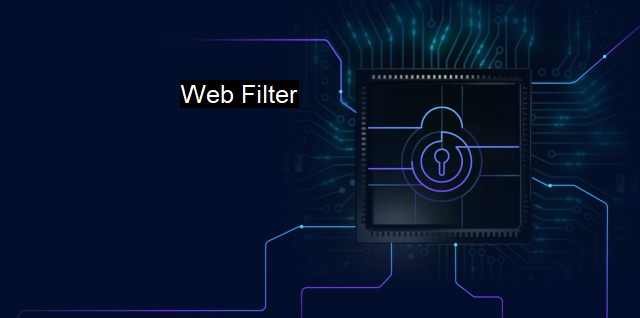What is Web Filter?
Protecting Your Business and Children Online: A Guide to Web Filters for Cybersecurity and Antivirus Protection
A web filter is a significant tool designed to restrict or control the content a user can view on the internet. It operates by identifying specific types of web content that can contain threats, then blocks or restricts access to these sites based on the user's predefined regulations. Web filters are typically used to deter users from visiting harmful websites that might contain viruses, phishing scams, harmful downloads, spyware, ransomware or other online threats.Web filters serve as a first wall of defense, preventing potential security threats that stem from unsolicited online content. They can filter internet content based on various criteria, including URLs, IP addresses, protocols, or even based on specific webpage content. By doing this, they provide an additional layer of protection, complementing traditional antivirus solutions that mainly protect against downloaded malicious files.
These filters employ several mechanisms to enforce internet safety. They utilize blacklists, which are lists containing the URLs of dangerous websites known for distributing malware, and actively deny access to them. They also use whitelists, a more restrictive form of web filtering, which only allows access to sites specified ‘safe’. Some web filters use a technology called "sandboxing" to execute and monitor potential threats in a safe, isolated environment, preventing them from affecting the user's system.
Another mechanism incorporated in web filters is the use of the heuristic analysis. This method checks for the characteristics of a webpage against those found in known malicious sites. If a certain score threshold is exceeded, the page is blocked from the user. Meanwhile, dynamic page analysis can detect harmful scripted content in real time. Some versions of web filters can even expose and prevent 'drive-by downloads', where malicious software is downloaded and installed on a user’s device without their knowledge.
Web filters are typically implemented at a network level, covering all devices connected to that network. it can also be implemented on individual devices. They are regularly part of a robust cybersecurity program within businesses and institutions, primarily to prevent network breaches and protect sensitive data.
Beyond security reasons, web filters are invaluable within educational or corporate establishments for productivity reasons. They can block access to content or sites that may cause distractions at the workplace or schools, such as social media sites or streaming platforms.
It's notable to mention though that while web filters serve as a critical tool in fortifying internet safety, they are not infallible. Cyber threats evolve at a rapid pace, and it's possible for some websites to slide through filters. Therefore, they should only constitute a part of a comprehensive cybersecurity defense strategy which includes antivirus software, firewalls, secure network design and education on safe internet use habits.
Web filters contribute significantly in shaping a secure digital environment, inhibitating the exposure to potential risks. With the increasing predominance of cybercrimes and internet fraud, implementing a web filter has become an imperative for internet safety. Despite not being completely foolproof, they provide a protective layer against the spectrum of threats lurking in the world wide web, working in conjunction with antivirus protection to ensure a comprehensive cybersecurity strategy. All in all, while curating a safe online browsing experience, they also endow users with a greater sense of control and peace of mind.

Web Filter FAQs
What is a web filter?
A web filter is a software tool that is used to block access to certain websites or types of online content. It is commonly used by organizations and individuals to protect against cyber threats and prevent unauthorized access to sensitive information.How does a web filter work?
A web filter typically uses a combination of techniques to block access to inappropriate content, such as blacklisting known malicious websites or analyzing the contents of web pages to detect and block harmful scripts or downloads. It may also use machine learning algorithms to adapt to new and emerging threats over time.What are the benefits of using a web filter?
Using a web filter can provide a number of benefits, including improved cybersecurity protection, better control over internet usage in the workplace, and increased productivity by reducing distractions from non-work-related websites. It can also help to prevent unauthorized access to sensitive information and reduce liability for organizations by blocking access to illegal or inappropriate content.Can a web filter replace antivirus software?
No, a web filter cannot fully replace antivirus software, as they serve different purposes. While a web filter is designed to prevent access to harmful websites and content, antivirus software is designed to detect and remove malicious software that may already be present on a computer. For maximum protection, it is recommended to use both a web filter and antivirus software together.| | A | | | B | | | C | | | D | | | E | | | F | | | G | | | H | | | I | | | J | | | K | | | L | | | M | |
| | N | | | O | | | P | | | Q | | | R | | | S | | | T | | | U | | | V | | | W | | | X | | | Y | | | Z | |
| | 1 | | | 2 | | | 3 | | | 4 | | | 7 | | | 8 | | |||||||